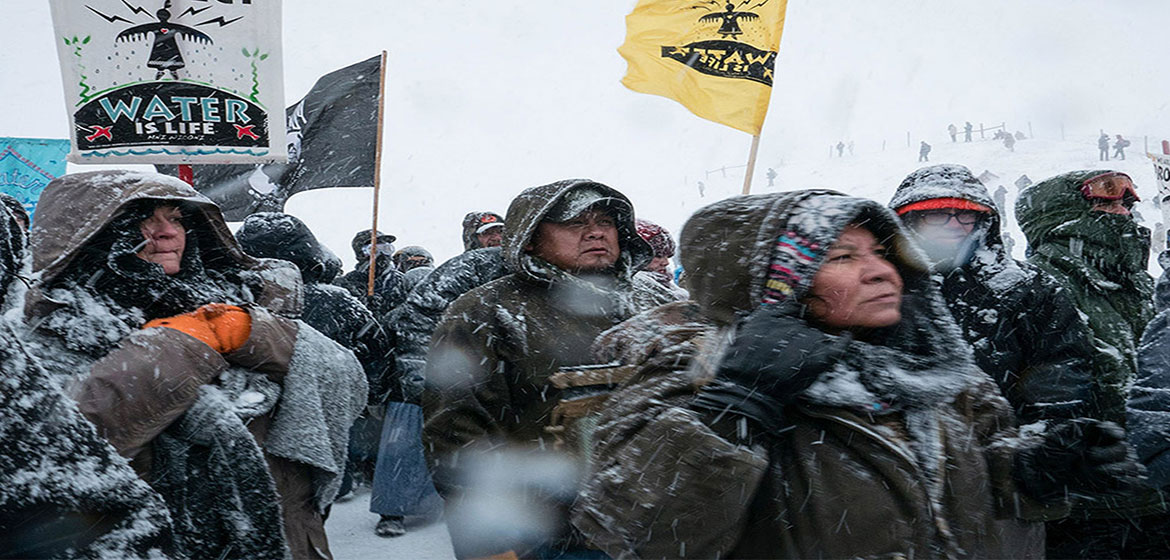The state's quick retreat should serve as a lesson for other legislatures: if you criminalize protest, we will sue.
By Vera Eidelman
South Dakota’s governor and attorney general today backed down from their unconstitutional attempts to silence pipeline protestors. In response to we filed alongside the ACLU of South Dakota and the Robins Kaplan law firm, the state has agreed to never enforce the unconstitutional provisions of several state laws that threatened activists who encourage or organize protests, particularly protests of the Keystone XL pipeline, with fines and criminal penalties of up to 25 years in prison.
The reached today and now headed to the court for approval is an important victory for the right to protest. It comes soon after a federal court of the pieces of the laws that infringed on First Amendment protected speech, and makes the court’s temporary block a permanent one.
The laws include the “Riot Boosting” Act, which gave the state the authority to sue individuals and organizations for “riot boosting,” . The court warned against the laws’ broad reach, noting that the laws could have prohibited:
- Sending a supporting email or a letter to the editor in support of a protest
- Giving a cup of coffee or thumbs up or $10 to protesters
- Holding up a sign in protest on a street corner
- Asking someone to protest
Under the First Amendment, that is impermissible.
The court rightly recognized the stakes of this case. And it put these anti-protest efforts in perspective, asking “if these riot boosting statutes were applied to the protests that took place in Birmingham, Alabama, what might be the result?” The answer: “Dr. King and the Southern Christian Leadership Conference could have been liable under an identical riot boosting law[.]”
Indeed, South Dakota’s unconstitutional anti-protest efforts echoed the suppression of past social movements. From the start, South Dakota Governor Kristi Noem called on “shut[ting] down” “out-of-state people” who come into South Dakota to “slow and stop construction” of the pipeline. Her harmful calls were reminiscent of government attempts throughout our history to delegitimize and minimize significant social movements as the work of “outside agitators,” including .
South Dakota’s quick and costly retreat (they’ll have to compensate plaintiffs for attorney’s fees under the settlement agreement) should serve as a lesson for to silence dissent.
In the last few years, we have witnessed a of states seeking to criminalize protest, deter political participation, and curtail freedom of association. These bills appear to be a direct reaction from politicians and corporations to some of the most effective tactics of those speaking out today, including water protectors , Black Lives Matter, and those calling for boycotts of Israel. These legislative moves are aimed at suppressing dissent and undercutting marginalized and over-policed groups voicing concerns that disrupt current power dynamics.
But the First Amendment guarantees people the right to voice their opposition. This includes our clients — four organizations (the Sierra Club, NDN Collective, Dakota Rural Action, and the Indigenous Environmental Network) and two individuals (Nick Tilsen with NDN Collective and Dallas Goldtooth with Indigenous Environmental Network) — all of whom are protesting construction of the Keystone XL pipeline and encouraging others to do the same.
Construction of the Keystone XL pipeline may be imminent. Pre-construction activities , and a hearing on the for the pipeline, which will serve as the basis for approval of any future permits, is coming up next Monday.
With the laws we challenged proclaimed unenforceable, protesters and protectors no longer have to worry about incarceration or fines as they protest against the construction. That is, at a minimum, how democracy should work.
Source:
Related to SDG 16: Peace, justice and strong institutions



